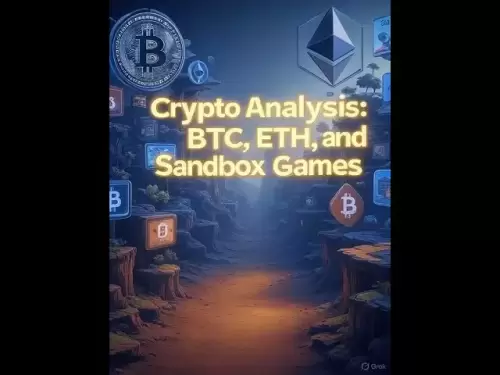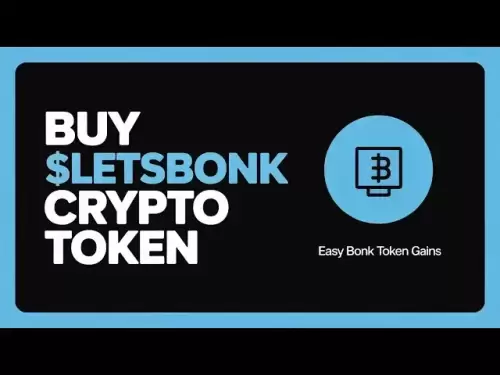-
 Bitcoin
Bitcoin $118100
-0.44% -
 Ethereum
Ethereum $3585
5.43% -
 XRP
XRP $3.434
5.65% -
 Tether USDt
Tether USDt $1.000
0.02% -
 BNB
BNB $743.8
3.89% -
 Solana
Solana $178.7
3.84% -
 USDC
USDC $1.000
0.03% -
 Dogecoin
Dogecoin $0.2381
12.81% -
 TRON
TRON $0.3270
3.62% -
 Cardano
Cardano $0.8315
4.93% -
 Hyperliquid
Hyperliquid $44.51
-4.42% -
 Stellar
Stellar $0.4710
1.52% -
 Sui
Sui $3.896
-2.51% -
 Chainlink
Chainlink $18.09
6.98% -
 Hedera
Hedera $0.2681
9.31% -
 Bitcoin Cash
Bitcoin Cash $516.7
4.83% -
 Avalanche
Avalanche $23.95
6.96% -
 Shiba Inu
Shiba Inu $0.00001490
5.67% -
 UNUS SED LEO
UNUS SED LEO $8.966
0.80% -
 Toncoin
Toncoin $3.294
4.39% -
 Litecoin
Litecoin $105.4
4.69% -
 Polkadot
Polkadot $4.356
5.30% -
 Uniswap
Uniswap $10.29
17.25% -
 Monero
Monero $327.9
-3.04% -
 Bitget Token
Bitget Token $4.942
4.33% -
 Ethena USDe
Ethena USDe $1.001
0.08% -
 Pepe
Pepe $0.00001348
2.17% -
 Dai
Dai $1.000
0.02% -
 Aave
Aave $320.8
0.58% -
 Bittensor
Bittensor $411.8
-4.07%
What is a decentralized identity (DID)?
Decentralized Identity (DID) empowers individuals with full ownership and control over their digital identities, promoting privacy, security, and reducing fraud.
Feb 18, 2025 at 10:42 pm

Key Points:
- Definition of Decentralized Identity (DID)
- Benefits of Using DIDs
- Steps to Create a DID
- Examples of DID Use Cases
- FAQs on Decentralized Identity
What is a Decentralized Identity (DID)?
Decentralized Identity (DID) is a new paradigm for managing digital identities. Unlike traditional centralized identity systems, where a single entity controls access to user data, DIDs are based on blockchain technology and give individuals full control over their own identities. With a DID, users can verify their identity and conduct transactions without relying on third parties, reducing the risk of fraud and data breaches.
Benefits of Using DIDs:
- Empowerment and Control: DIDs provide individuals with complete ownership and control over their digital identities, empowering them to decide who has access to their data and when.
- Increased Privacy and Security: By eliminating the need for third-party verification, DIDs enhance privacy and safeguard personal data from malicious actors.
- Reduced Fraud and Cybercrime: DIDs enable secure and verifiable authentication, minimizing the risk of identity theft and other cybercrimes.
- Improved Interoperability: DIDs facilitate interoperability across different blockchain networks, allowing users to access services and applications without facing compatibility issues.
Steps to Create a DID:
- Generate a DID Document: The DID document is a JSON file that contains essential information about the DID, such as the DID itself, the public key, and other metadata.
- Publish the DID Document: The DID document is published on a decentralized network, such as a blockchain, to make it globally accessible and verifiable.
- Store the DID: Users can store their DIDs in a DID wallet or other secure storage solution to manage and access them conveniently.
Examples of DID Use Cases:
- Secure Authentication: DIDs can be used for secure authentication in various online platforms and services, eliminating the need for usernames and passwords.
- Digital Identity Proof: Individuals can use DIDs to prove their identity in a verifiable and tamper-proof manner, such as for KYC (Know Your Customer) processes.
- Decentralized Social Networking: DIDs can enable decentralized social networking where users have full control over their profiles and interactions.
- Data Sharing and Management: DIDs provide a secure and privacy-preserving way for individuals to share and manage their data with trusted parties.
FAQ on Decentralized Identity:
- Q: What is the difference between a DID and a traditional identity?
- A: A DID gives individuals complete control over their own digital identity, unlike traditional identities controlled by centralized authorities.
- Q: How do I create a DID?
- A: You can follow the steps outlined in the article to generate, publish, and store your DID.
- Q: What are the benefits of using DIDs?
- A: DIDs offer enhanced privacy, security, reduced fraud, and improved interoperability compared to traditional identities.
- Q: What are some examples of DID use cases?
- A: DIDs are used in secure authentication, digital identity proof, decentralized social networking, and data sharing and management.
Disclaimer:info@kdj.com
The information provided is not trading advice. kdj.com does not assume any responsibility for any investments made based on the information provided in this article. Cryptocurrencies are highly volatile and it is highly recommended that you invest with caution after thorough research!
If you believe that the content used on this website infringes your copyright, please contact us immediately (info@kdj.com) and we will delete it promptly.
- Penny Altcoins Eyeing $1 in Q3 2025: Cardano, BlockchainFX, and the Hunt for Crypto Gold
- 2025-07-19 05:10:13
- Trump, Stablecoins, and New Laws: A Crypto Revolution?
- 2025-07-19 05:10:13
- Princess Anne's 75th Birthday: A Royal First and a Celebration of Duty
- 2025-07-19 04:50:13
- Flare Crypto: Powering the Decentralized Future with a Robust Data Backbone
- 2025-07-19 04:55:13
- Bitcoin's Record Highs: Navigating Risk Assets in the Crypto Craze
- 2025-07-19 05:00:13
- Passive Income Revolution: Crypto Cloud Mining in 2025
- 2025-07-19 05:05:13
Related knowledge
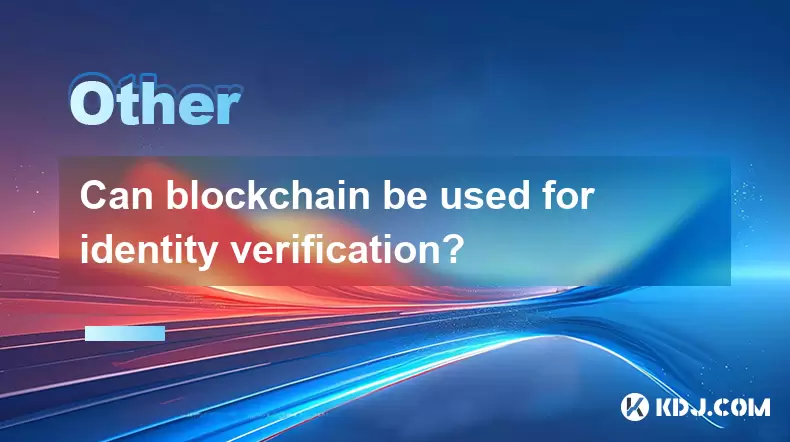
Can blockchain be used for identity verification?
Jul 18,2025 at 02:14pm
Understanding Identity Verification in the Digital AgeIn the modern digital landscape, identity verification has become a critical component for ensur...
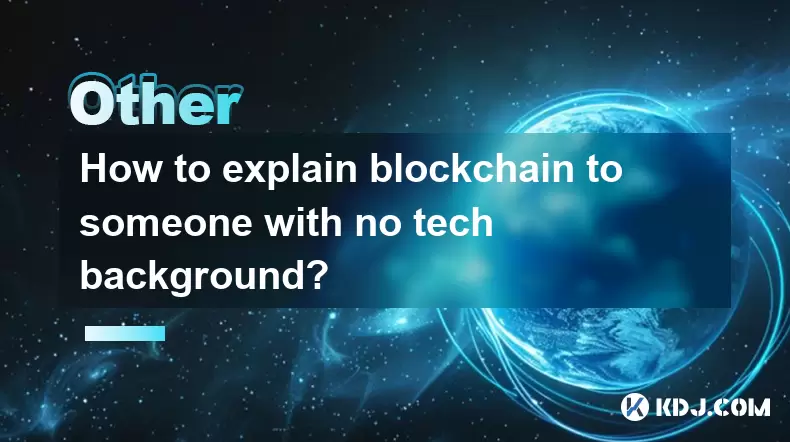
How to explain blockchain to someone with no tech background?
Jul 18,2025 at 11:08pm
Understanding the Basics of BlockchainTo explain blockchain to someone with no tech background, it's essential to start with simple analogies and avoi...

What are the highest paying blockchain jobs?
Jul 19,2025 at 04:49am
Overview of Blockchain Job OpportunitiesThe blockchain industry has evolved from a niche technology to a mainstream field offering a wide array of job...
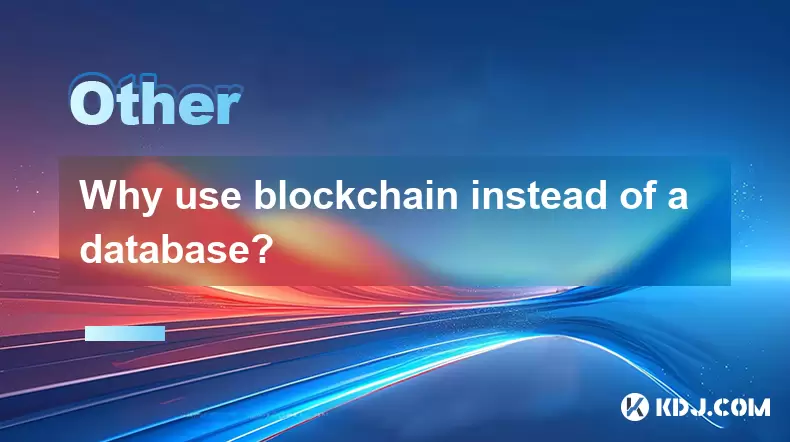
Why use blockchain instead of a database?
Jul 18,2025 at 07:00pm
Decentralization and Trustless SystemsOne of the core reasons for choosing blockchain over a traditional database lies in the concept of decentralizat...

What is a smart contract on the blockchain?
Jul 18,2025 at 06:42pm
Understanding the Concept of a Smart ContractA smart contract is a self-executing contract with the terms of the agreement directly written into code....
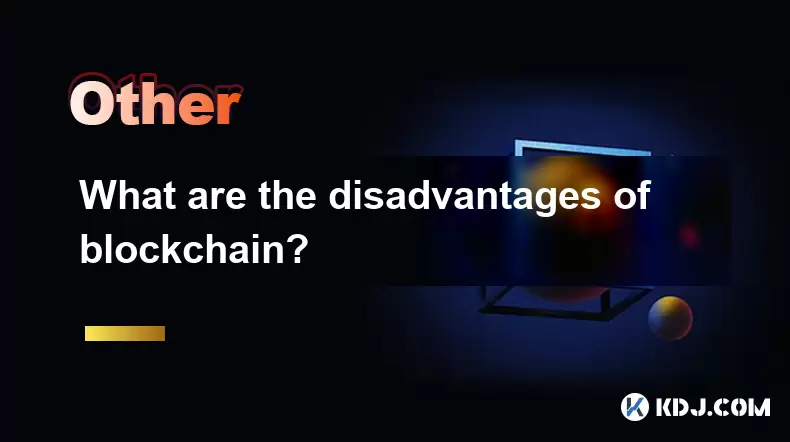
What are the disadvantages of blockchain?
Jul 18,2025 at 10:08pm
High Energy Consumption and Environmental ImpactOne of the most frequently discussed disadvantages of blockchain technology is its high energy consump...

Can blockchain be used for identity verification?
Jul 18,2025 at 02:14pm
Understanding Identity Verification in the Digital AgeIn the modern digital landscape, identity verification has become a critical component for ensur...

How to explain blockchain to someone with no tech background?
Jul 18,2025 at 11:08pm
Understanding the Basics of BlockchainTo explain blockchain to someone with no tech background, it's essential to start with simple analogies and avoi...

What are the highest paying blockchain jobs?
Jul 19,2025 at 04:49am
Overview of Blockchain Job OpportunitiesThe blockchain industry has evolved from a niche technology to a mainstream field offering a wide array of job...

Why use blockchain instead of a database?
Jul 18,2025 at 07:00pm
Decentralization and Trustless SystemsOne of the core reasons for choosing blockchain over a traditional database lies in the concept of decentralizat...

What is a smart contract on the blockchain?
Jul 18,2025 at 06:42pm
Understanding the Concept of a Smart ContractA smart contract is a self-executing contract with the terms of the agreement directly written into code....

What are the disadvantages of blockchain?
Jul 18,2025 at 10:08pm
High Energy Consumption and Environmental ImpactOne of the most frequently discussed disadvantages of blockchain technology is its high energy consump...
See all articles
























